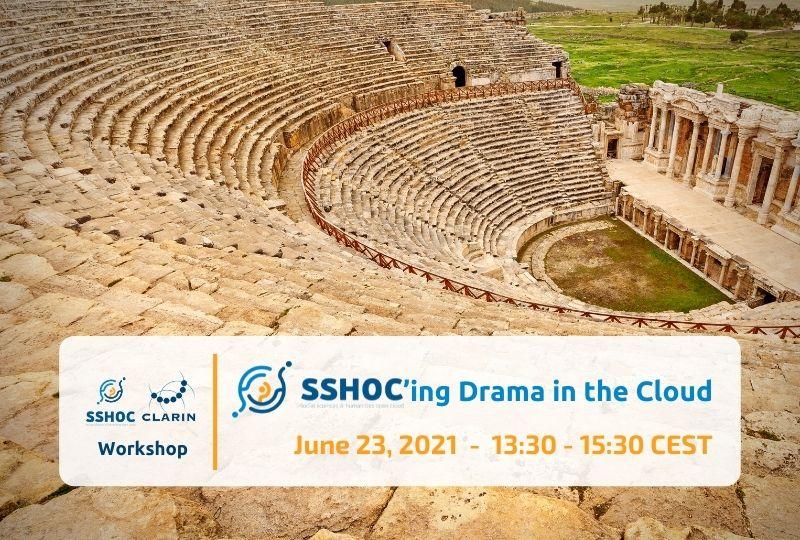
- Social Sciences & Humanities Open Cloud
SSHOC’ing Drama in the Cloud – encoding theatrical text collections and the added value of SSHOC & CLARIN services.

Date:
23 June 2021 - 13:30 to 15:30
Location:
LIBER 2021 Online Conference
At LIBER 2021 Online Conference, CLARIN and SSHOC will offer a webinar showcasing how SSH researchers can benefit from the resources and services offered by SSH research infrastructures in order to produce and exploit highly encoded historical textual data. After the webinar, the participants will be able to successfully guide and advise SSH researchers (with a particular focus on literature studies) in their choice amongst existing resources and tools, based on their research question.
The participants will be able to:
- learn about the Text Encoding Initiative format (TEI) which is widely adopted in SSH for the XML-based mark-up of textual documents; and see its potential benefits on concrete examples;
- learn how to explore and visualise TEI collections with the help of tools and services offered by CLARIN and SSHOC;
- see how to optimize research workflows with the help of SSH Open Marketplace (SSHOC).
The use case will be based on ongoing work carried out within the SSHOC project (WP3) on a corpus of theatrical play texts from the 17th and 18th century covering examples in three languages (English, French, and Spanish). The webinar will also include a hands-on part which will allow the participants to test proposed methods, resources and tools.
Post Event Report
Target audience: The webinar is primarily aimed at librarians, but registration is opened for anyone interested in the topic.
Speakers:
Maria Eskevich (CLARIN ERIC)
Maria Eskevich is CLARIN ERIC Central Office Coordinator. Since joining CLARIN in 2018, she has been involved in a number of H2020 Projects, such as PARTHENOS, SSHOC, TRIPLE, as well as in CLARIN collaboration with Europeana. She has a strong background in language and speech technologies, information retrieval and evaluation, digital humanities. Her research interests span from multimedia retrieval, evaluation of multimedia and podcast search, use of crowdsourcing technologies and social media, to text and data mining (TDM), archiving, and use of those technologies in the context of digital humanities. Among other things, she is currently co-organising Multilingual Semantic Search task at Community Evaluation Effort for MultiLingual Information Access on COVID-19 (MLIA).
Francesca Frontini (CLARIN ERIC)
Francesca Frontini is currently a member of the Board of Directors of CLARIN ERIC and Research Scientist at ILC-CNR. She focusses on the further developing and steering the CLARIN Ambassadors programme, and is interested in the deelopment and use of language resources, named entity recognition and textual analysis. In particular she has worked on NLP methods for the analysis of literary texts and literary criticism. In addition, she has published extensively on issues relating to language resource documentation, preservation and standardisation.
Slides
Workshop Video
